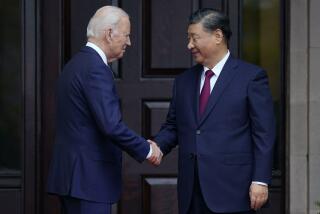Beijing responds to U.S. alliances with ‘wolf warrior’ defiance. Will it backfire?
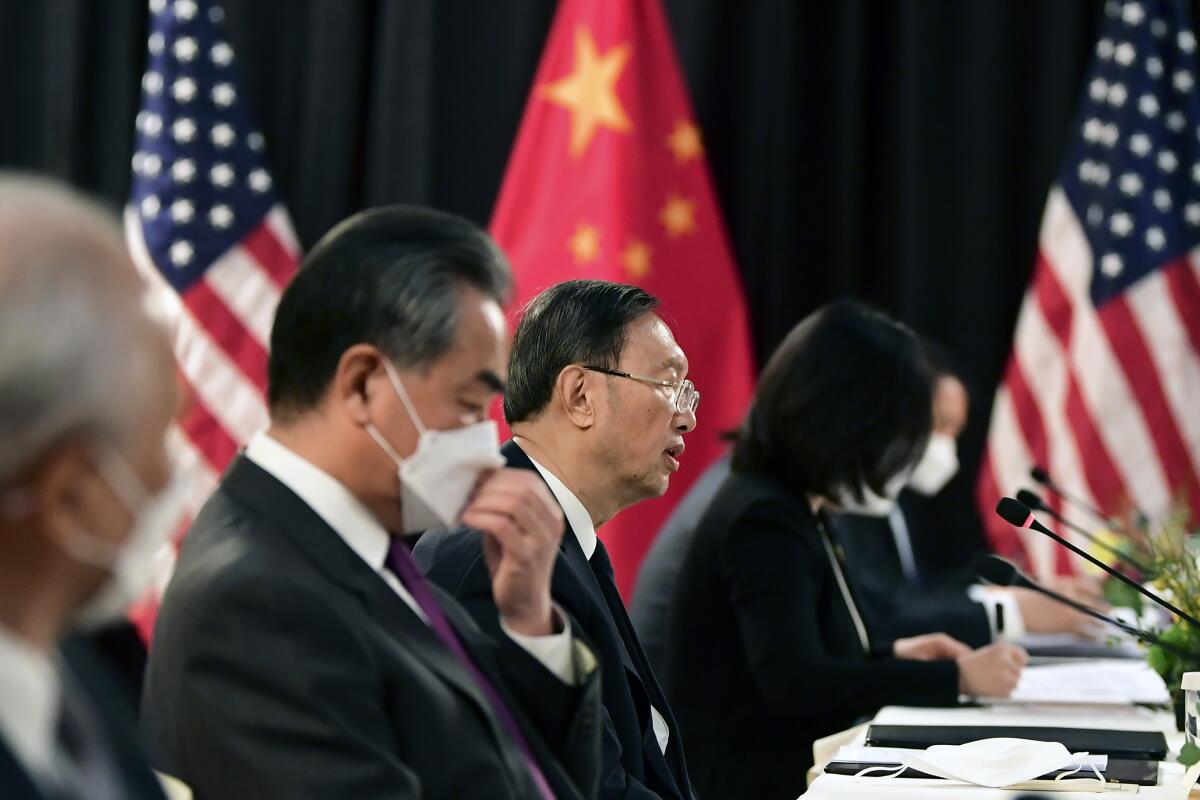
Beijing’s attitude toward the United States and its allies can be summed up in two stinging rebukes printed on T-shirts, stickers, hats, umbrellas and all kinds of Taobao products: “America is not qualified to talk down to China” and “Chinese people will not put up with this!”
Those sentiments, spoken at the U.S.-China meeting in Anchorage last month by Yang Jiechi, the Chinese Communist Party’s foreign policy czar, have been repeated incessantly by state media and commercialized by enterprising online sellers. They capture the hubristic defiance that has defined Chinese foreign policy over the last three months as Beijing challenges a Biden administration that is restoring America’s global alliances.
Beijing’s refusal to tolerate criticism from America or its friends has grown more bellicose as international condemnation has accelerated. The week before the Anchorage meeting, President Biden held a virtual “Quad” summit with India, Australia and Japan. Days later, the U.S. along with the European Union, Britain and Canada launched sanctions over human rights abuses against Uyghurs and other minorities in Xinjiang.
The following week, 14 countries issued a joint statement criticizing the WHO investigation of COVID-19 origins in China. This month, Japan’s prime minister issued a joint statement with Washington calling for “peace and stability across the Taiwan Strait,” the first mention of Taiwan in a U.S.-Japan statement in nearly 50 years.
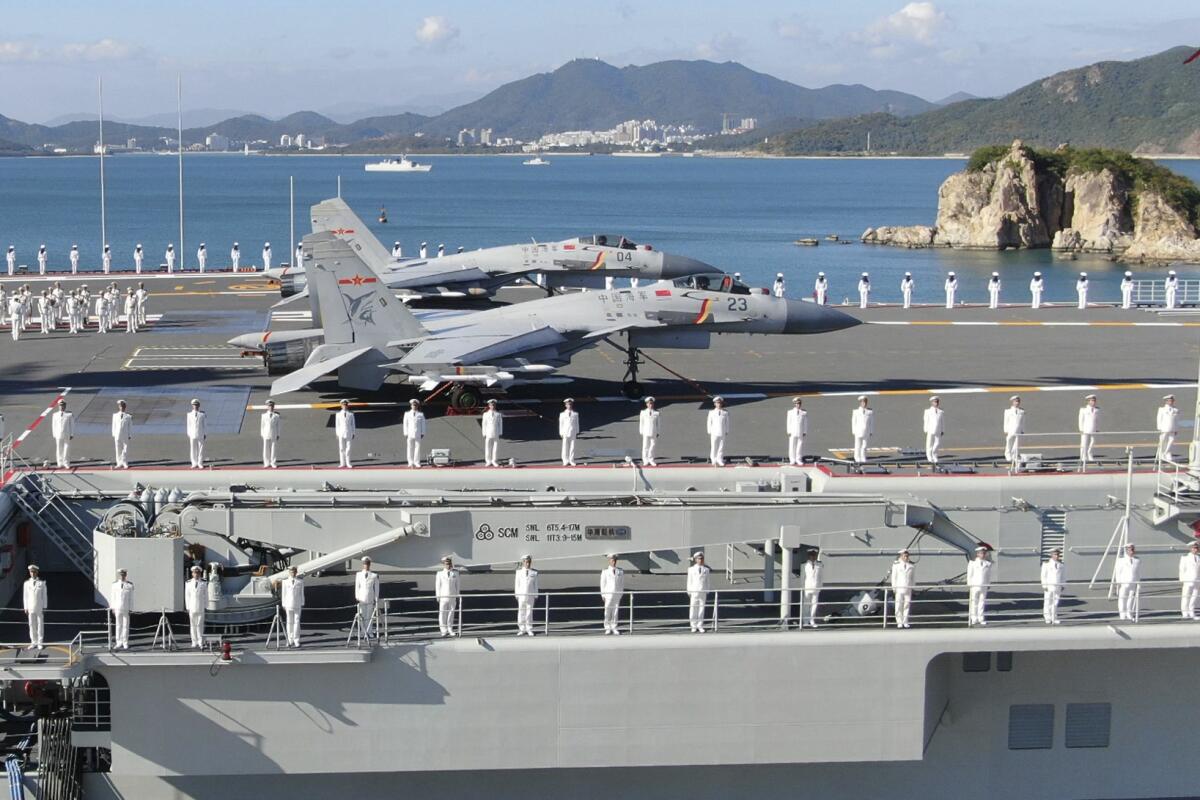
Faced with such coordinated pressure, an economically strong and increasingly confident Beijing has shown no sign of relenting. It has instead stepped up military activity around the Taiwan Strait, the most dangerous flashpoint between Beijing and Washington. China has also passed a new law allowing its coast guard to fire on foreign vessels in the South China Sea, continued its crackdowns in Hong Kong and Xinjiang, and issued counter-sanctions on Western scholars, think tanks, lawyers, members of parliament and several EU institutions.
Propaganda departments have ramped up nationalism at home, encouraging a boycott of foreign companies concerned about forced labor in Xinjiang, while China’s diplomats have increased “wolf warrior” aggression abroad.
China’s ambassador in Sweden recently threatened a journalist, demanding that he stop reporting about China critically or else “face the consequences” of his actions. Earlier this year, China’s embassy in Prague threatened that Czech companies in China would suffer if a Czech lawmaker visited Taiwan.
On Twitter, China’s consul general in Rio de Janeiro recently posted a photo of Canadian Prime Minister Justin Trudeau, calling him “boy” and “spendthrift!!!” and accusing him of turning Canada into a “running dog of the U.S.”
Such an approach from the outside appears counterproductive, especially when the U.S. is seeking to distance itself from the toxic global policies of the former Trump administration, said Susan Shirk, chair of the 21st Century China Center at UC San Diego.
“They [Beijing] pick fights with so many other countries, they make threats, and they’ve kind of driven everyone else into our arms,” Shirk said. “It looks very self-defeating, overreaching — which makes you wonder, how is Xi Jinping making decisions? Is he living in an echo chamber? Is he getting good information about the backlash to Chinese actions or not?”
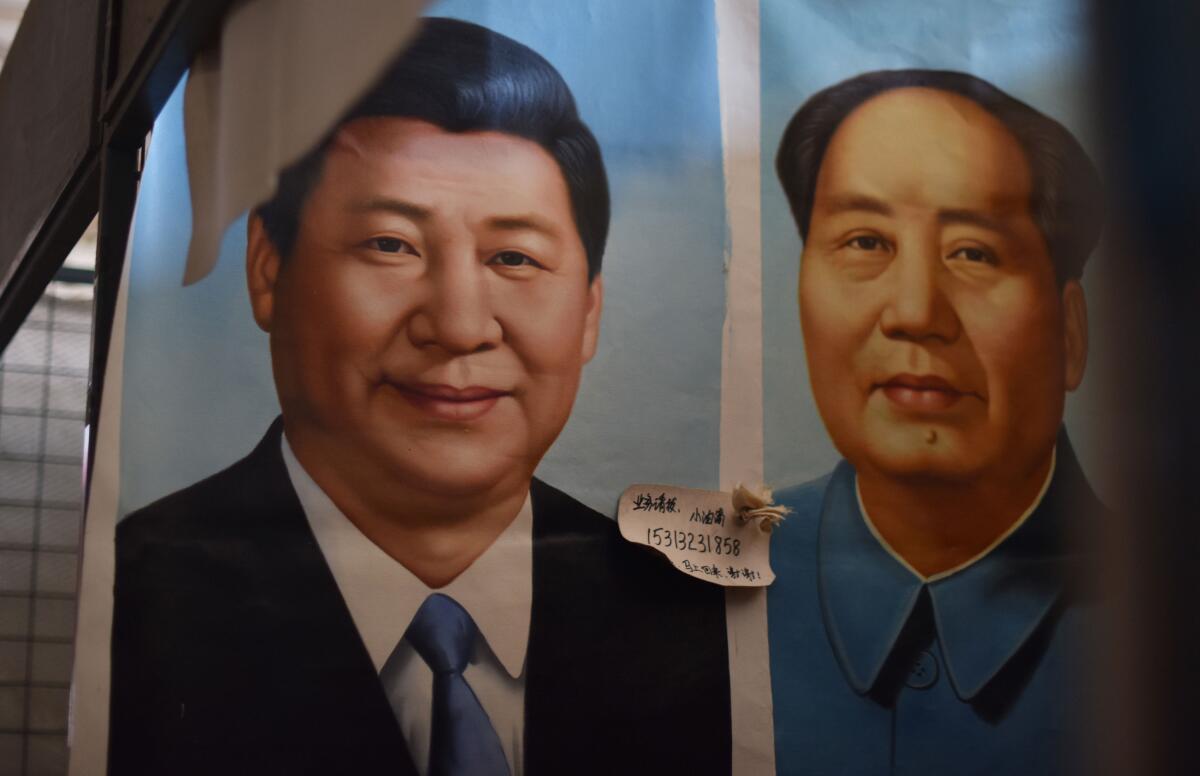
Ideology is one explanation for China’s behavior. President Xi Jinping calls his reign a “new era” in which “great changes unseen in a hundred years” are unfolding. From Xi’s perspective, shaped by a lifetime steeped in party ideology, history is linear and inevitably moves toward the triumph of China and its brand of communism over what he sees as imperiled Western liberal democracies.
This strategy is all the more critical —and symbolic — this year, which marks the 100th anniversary of the Chinese Communist Party’s founding. Domestic propaganda resounds with the success and strength of Communist leadership; there is no space for apologetic behavior on the global stage.
China’s state media have celebrated the country’s containment of the coronavirus, claims of eradicating absolute poverty and a stunning economic growth rate of more than 18% in its first quarter this year, while looking with derision upon America’s racial strife, decaying infrastructure, mass shootings and half a million coronavirus deaths. They project a sense that prosperity lies in China’s future, not with the West.
“There’s a domestic narrative that if China is becoming stronger, why should China’s foreign policy become weaker?” said Yun Sun, director of the Stimson Center’s China Program.
“There’s an elevated sense of confidence in that the Chinese believe they have weathered the storm of COVID and the storm of the Trump administration,” Sun said. China believes itself the “relative winner,” she said, and thus it can speak to the U.S. and its allies as it likes.
“It’s like, OK, we’re strong, we’re getting stronger,” said Nadège Rolland, senior fellow at the National Bureau of Asian Research. “We’re going to do what we’re going to do and we’re not going to walk on eggshells with Westerners anymore.”
China’s confidence is based on nearly a decade of building Chinese influence across the non-Western world. Since 2013, China has pledged to invest hundreds of billions of dollars in Belt and Road projects in developing nations. It has cultivated elites with exchange and training programs that showcase China’s development while promising not to interfere with a country’s politics.
Amid the COVID-19 pandemic, China has also become a critical provider of vaccines to nations in dire need, sending millions of doses to countries like Chile, Indonesia and Turkey, while the United States has focused on vaccinating at home first.
China’s tech, finance and trade infrastructure plans aim to establish “an alternative system with China as the center” across much of the developing world, Rolland said. The countries that have become dependent on China do not offer the same kind of military alliances and partnerships the United States has with its allies. But countries often support China in venues like the U.N.
Fifty countries including much of Africa and many Muslim-majority nations like Egypt, Iraq, Pakistan and Bangladesh signed a letter to the U.N. supporting China’s Xinjiang actions in 2019, versus 22 mostly Western nations condemning China on Xinjiang.
In 2020, 39 countries — again, mostly Western — sent a letter against China’s oppression of ethnic minorities to the U.N. Human Rights Council. Cuba led 45 countries including Russia, Myanmar, Saudi Arabia and Syria in a counter-letter praising China’s care for human rights.
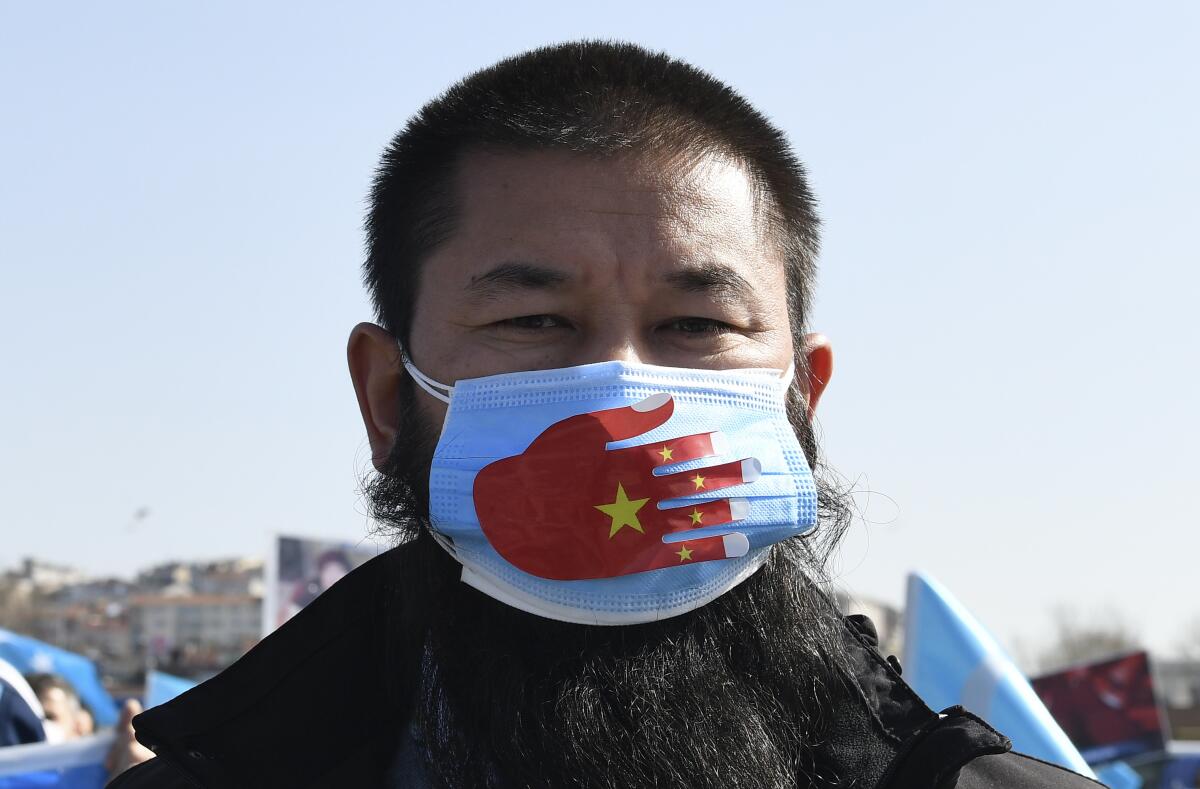
“It’s the politics of the numbers in a way. It’s the votes. It’s the out-crowding of liberal democracies,” Rolland said. “As you gather more and more countries of the emerging, developing world behind you, you become the leader of the global South.”
Meanwhile, the strength of U.S. alliances remains to be seen. Late last year, the EU entered a major investment deal with China just before Biden’s inauguration. The pact promised European investors greater access to China’s automotive industry, manufacturing, financial services and other sectors. It pledged China would make state-owned enterprises act “in accordance with commercial considerations” and stop forced technology transfers.
Although it still had to be ratified by the European Parliament, the agreement signaled that Europe’s leaders might go their own way when it comes to Beijing.
The agreement, however, was heavily criticized within Europe for its vague wording and lack of enforcement provisions. It is unlikely to be ratified, especially after China’s sanctions against EU lawmakers and institutions who spoke about Xinjiang, said Reinhard Buetikofer, a German politician who is among the sanctioned European Parliament members.
China’s “hegemonic arrogance” under Xi has damaged its image in Europe and alienated even countries like Germany that have a strong commercial interest there, Buetikofer said. The Trump administration made it difficult for Europe to work together with America on China; Biden makes it easier, but skepticism over the transatlantic relationship remains.
“There’s still a lack of trust, because there’s always an afterthought — what if? What if Biden loses the midterms? What if there is a resurrection of Trump in 2024?” Buetikofer said. “There’s no way of returning to an ‘America leads, everyone else follows’ kind of partnership.”
Japan has made a strong shift toward Washington in recent months, but it also wants more from its U.S. alliance, said Ryo Sahashi, professor of international politics at the University of Tokyo. Japan’s affirmation of the U.S. alliance under Biden is a “return to basics,” he said: “The United States is the only partner crucial for Japan’s own security and survival.”
At the same time, Japan worries about its economic interests especially as the Biden administration is urging a tougher line against Beijing. China is Japan’s largest trading partner. Japan wants the U.S. to rejoin the Trans-Pacific Partnership, yet there was no mention of that in the U.S.-Japan joint statement this month, which focused on security and shared values.
“Sometimes the American side is too visionary,” Sahashi said. “Don’t take me wrong, we are fine with such a vision. But we also want to hear, where are our interests going?”
However U.S. alliances fare, China is determined not to budge on any of its “core interests,” said Shi Yinhong, director of the Center on American Studies at People’s University of China.
There is a chance for collaboration on some issues: Xi attended Biden’s climate summit last week, and Chinese authorities are expected to approve a foreign vaccine soon, bolstering international vaccine recognition and travel.
But if Beijing wanted to win back favor with U.S. allies, Shi said, it would have to compromise on “the problems they are most furious about”: Hong Kong, Taiwan, military construction, South China Sea, Xinjiang, China’s political system — all untouchable in China’s current domestic climate, where political security is paramount and dependent on nationalistic demonstrations of power.
“You have to make Chinese people believe that the Chinese government, the central committee of the CCP, is the best defender of China’s national interests and honor,” Shi said. Better to lose friends but look strong than to show weakness and threaten public legitimacy at home.
“The calculation is clear: It’s not worth it,” he said.
More to Read
Start your day right
Sign up for Essential California for news, features and recommendations from the L.A. Times and beyond in your inbox six days a week.
You may occasionally receive promotional content from the Los Angeles Times.
